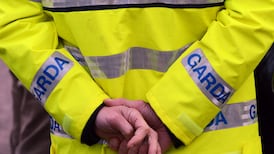Former Sinn Féin leader Gerry Adams has again insisted he was never in the IRA despite acknowledging that he was in a car crash in west Belfast in 1969 with a man who was described as being on “active service” for the paramilitary organisation at the time.
Mr Adams, who was giving evidence to the Ballymurphy inquest in Belfast on Wednesday, accepted that he was a passenger in a car in November 1969 in which an IRA member, Liam McParland, was killed.
Mr Adams said that he was returning from a day in Ballinamore in Co Leitrim when the fatal crash happened on the M1 close to Kennedy Way in west Belfast.
Questioned by lawyer Peter Coll, acting for the British ministry of defence, Mr Adams said he did not know at the time that Mr McParland was a local IRA commander in west Belfast.
Mr Coll referred to how the republican newspaper An Phoblacht in 2009 referred to the 40th anniversary of the death of Mr McParland in which it stated that he “died in a car crash on 6 November 1969 while on IRA business”. It also described him as being on “active service” at the time of his death.
Mr Adams said that two other people were in the car at the time. He said he had been offered a lift back in the car. He said he did not ask the people in the vehicle “about their business”.
Mr Adams again insisted he was never in the IRA. “I was not a member of the IRA. I have never disassociated myself from the IRA and I never will until the day I die,” he told the inquest.
He described the IRA as an “organisation of volunteers of men and women and women who acted as they saw themselves patriotically and duty bound to do”.
Mr Adams added that he “deeply regretted there was a war” and knew victims of the IRA would not “like what I am saying”.
Operation Demetrius
Mr Adams said that he did not see any of the Ballymurphy shootings which left 11 people dead.
The inquest is examining how 10 of the victims died in west Belfast during Operation Demetrius, the introduction of internment without trial, in August 1971.
Over three days from August 11th to 13th, 10 people including a priest who had gone to the aid of one of victims and a 50-year-old mother of eight children were shot dead. The shootings which became known as the Ballymurphy massacre were ascribed to members of the British parachute regiment, although more recently the loyalist Ulster Volunteer Force said it was responsible for some of the deaths.
An 11th victim of the violence, does not come under the terms of the inquest. Paddy McCarthy died from a heart attack after a soldier allegedly put an empty gun into his mouth and pulled the trigger.
Referring to the situation at the time, Mr Adams told the inquest that the British government rather than concede the “modest demands” of the civil rights movement opted for the military option and reneged on their political responsibility.
“They handed over to the generals and generals do what generals do. The paratroopers were ordered to pacify and subdue and kill the enemy and the enemy in this instance were the decent people of Ballymurphy,” he said,
“It is hardly surprising that the Provisional IRA came into the ascendancy fairly quickly,” he added.
Shortly before he was to give evidence on Wednesday, Mr Adams issued a statement stating that he “was not a witness to any of the killings by British Paras of the nine men and one woman whose deaths are the subject of the inquest”.
“However, I did witness aspects of the events in that area following internment; including the courageous rescue by local people of one young boy who had been shot by a British soldier,” he said.
“My family home, from which my mother was evicted by the Paras, was also damaged beyond repair by them,” said the Louth TD.
“I want to commend the enormous courage of all of the families who have campaigned for decades for truth and justice for their loved ones.
“In recent months they have had to listen to the evidence of many witnesses, including former British soldiers responsible for some of the deaths, who have described in chilling detail the killing of their loved ones,” said Mr Adams.
“It has been a traumatic experience for the families.”











